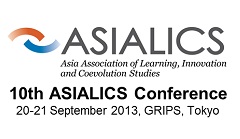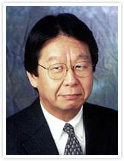
| 日時 | 20-21 September 2013 |
|---|---|
| 場所 | National Graduate Institute for Policy Studies (Tokyo, Japan) (Access) |
| 主催 | Asia Association of Learning, Innovation and Coevolution Studies (ASIALICS) GRIPS Innovation, Science and Technology Policy Program (GIST), National Graduate Institute for Policy Studies (GRIPS) |
| 言語 | English |
ASIALICS is a network among scholars, practitioners and policymakers who are interested in a learning, innovation and competence building system in Asia. It has a cooperative relationship with the Global Network for the Economics of Learning, Innovation, and Competence Building Systems (GLOBELICS). ASIALICS aims to explore and develop the concept of learning, innovation and competence building as an analytical framework. The objective of ASIALICS is to stimulate the establishment of knowledge based strategies for economic development in Asia. The idea is to bring together interesting issues about what is going on in Asian countries and companies and to share experiences regarding methodology, analytical results and policies. To achieve this idea, a group of Asian scholars with strong support from GLOBELICS held the first international conference on Asian innovation systems in Bangkok, Thailand in April 2004. Following the first conference, ASIALICS organized annual conferences in Jeju Island (Korea), Shanghai, Kuala Lumpur, Bangalore, Hong Kong, Taipei, Hanoi, and Manila.
Universities and public research institutes have been expected to play more important roles in the era of 'learning economy'. In Asia, several countries initiated policies to enhance the roles of universities and public research institutes in innovation systems, especially their interaction and contribution to industry and society. These policy initiatives include introduction of appropriate institutions, namely laws, regulations and norms that facilitate universities and public research institutes to easily and effectively engage with industry. Governments also provide incentives in terms of grants and public equity participation to encourage such collaborations. New organizations such as technology licensing offices (TLOs) and patent administration offices have been set up in many universities and public research institutes across Asia. Infrastructures such as science parks and incubators have flourished. Nonetheless, there are several issues regarding the roles of universities and public research institutes that need to be extensively examined by both academics and policy makers.


Detailed Program (incl. Timetable of Concurrent Sessions) (Final Version) Download
| Time | Sessions | 9:00-9:30 | Registration |
|---|---|
| 9:30-12:00 | ASIALICS Symposium (open to the public) |
| 9:30-10:00 |
|
| 10:00-10:45 |
|
| 10:45-11:30 |
|
| 11:30-12:00 |
|
| 12:00-13:00 | Lunch |
| 13:00-17:45 | Concurrent Sessions |
| 13:00-14:30 |
|
| 14:30-16:00 |
|
| 16:00-16:15 | Tea & Cofee Break |
| 16:15-17:45 |
|
| 17:45-18:30 | Free |
| 18:30-20:30 | Official Dinner |
|
| Time | Sessions |
|---|---|
| 8:30-9:00 | Registration |
| 9:00-12:15 | Concurrent Sessions |
| 9:00-10:30 |
|
| 10:30-10:45 | Tea & Cofee Break |
| 10:45-12:15 |
|
| 12:15-13:30 | Lunch |
| 13:30-15:30 | A Round-table Discussion: Lessons learnt from University/Public Research Institute-Industry Links in Asia |
| 13:30-15:00 |
|
| 15:00-15:30 |
|
| 15:30-16:00 | Books Launch |
| 16:00-16:30 | A Round-table discussion on 10th Year Anniversary of Asialics: What we have achieved and what we should do next? |
| 16:30-17:00 | Closing Ceremony and Announcement of 11th ASIALICS Conference |
|
Early Bird Rate |
Standard Rate |
Fee includes; |
Regular |
23,000 JPY |
28,000 JPY |
1) Access to all conference sessions |
Student |
15,000 JPY |
20,000 JPY |
1) Access to all conference sessions 2) Conference kit 3) Coffee, Lunch and Official Dinner on Sep 20. |
Accompanying Person |
10,000 JPY |
10,000 JPY |
1) Coffee, Lunch and Official Dinner on Sep 20. |
*Japan Standard Time
Payment by credit card or bank transfer is acceptable.
Credit Card |
Paypal payment |
|
Bank transfer |
Bank transfer to |
Mizuho Bank Limited, Shimbashi Chuo Branch |
SWIFT code |
MHBKJPJT |
|
Account No. |
1750695 |
|
Account Name |
WORLD CREATIONS INC |
|
Bank transfer in Japan |
口座名 |
株式会社ワールドクリエーション |
銀行 |
三井住友銀行 日比谷支店 当座 0290307 |
|
みずほ銀行 新橋中央支店 普通 1750695 |
||
- Authors of accepted paper may pay by August 30, 2013 to be included in the program.
- Registration is required to attend in the conference activities
- Attendees must at all times wear their name tags gain access to the activities
- Cancellation to attend the conference must be made in writing addressed to wci.for.asialics2013@wci-jp.com
- Authors whose paper accepted could not transfer free registration right to non-author.
- Official certificates of participation will be given to the participants at the reception during the conference.
GRIPS has reserved a sufficient number of rooms at the following hotels for the participants. Both hotels are located within walking distance of GRIPS. Hotel assignment will be made on a first-come, first-served basis through the registration form.
Hotel Asia Center of Japan |
||
Price/Night |
8,400 JPY (for 1person,including tax) |
|
Address |
8-10-32, Akasaka, Minato-ku, Tokyo |
|
TEL / FAX |
(81)-3-3402-6111/ (81)-3-3402-0738 |
|
WEBSITE |
||
From Airports |
||
From GRIPS |
About 12 minute walk |
|
Hotel IBIS |
||
Price/Night |
11,650 JPY (for 1person,including tax) |
|
Address |
7-14-4 Roppongi, Minato-Ku, Tokyo |
|
TEL / FAX |
(81)-3-3403-4411 / (81)-3-3479-0609 |
|
WEBSITE |
||
From Airports |
||
From GRIPS |
About 8 minute walk |
|
Based on the Immigration Control and Refugee Recognition Act, in principle a foreign national wishing to enter Japan is required to have a valid passport issued by the government of their own country with a visa issued by the Government of Japan.
The visa indicates that it is appropriate for the foreign national to enter and stay in Japan. Furthermore, holding a visa only one of the requirements for entering Japan and does not guarantee that the holder of the visa will be able to enter Japan.
Visas are issued in the Japanese embassy or consulate in the foreign country. Visas cannot be obtained after arriving in Japan.
The documents that are necessary for the application differ depending on the travel purpose and the nationality of the applicant.
Refer to the following website.
The secretariat will issue the documents necessary for visa application based on the information you enter in the registration form.
Nationality of the visa applicant who will travel to Japan: |
|
China |
|
Russia or NIS countries |
http://www.mofa.go.jp/j_info/visit/visa/short/russia_nis.html |
Philippines |
http://www.mofa.go.jp/j_info/visit/visa/short/philippine.html |
Other Nationalities |
http://www.mofa.go.jp/j_info/visit/visa/short/other_visa.html |
Registration Closed. Please contact asialics2013@grips.ac.jp if you are planning to attend.
Registration and arrangement of accommodation and airplane tickets (when required) will be done by;
World Creations Inc.
2-18-2NKK Building 8th floor, Nishi-Shimbashi, Minato-Ku, Tokyo, Japan 105-0003
Phone +81-3431-2291
FAX +81-3-3431-2738
Email: wci.for.asialics2013@wci-jp.com
Please send the full paper of your presentation to wci.for.asialics2013@wci-jp.com by August 15.
Following guidelines are based on those of GLOBELICS.
Please use Times New Roman 12-point font, 1.5 lines spaced, 1-inch (2.5 cm) margin all around, and 8.27" x 11.69" (21cm x 29.7cm) (A4) page setting. Place page number in the bottom right corner.
Abstract: approximately 150 words, maximum 200;
Keywords: approximately 5-7 words or phrases.
Use only three levels of headings. Use bold-face for all three. Main headings (all capital letters, cantered) are first. Second-level headings (title-style letters; flush left) are next. Third-level headings (first letter of first word capitalized; indented; italicized; and run into paragraph) are next.
Don't skip steps: no second-level headings before you use a first-level heading, for instance. Use second- and third-level headings in sets of two or more. Examples:
Use the Harvard (name and date) short reference system for citations in the text with a detailed alphabetical list at the end of the paper. For example 'Hamel (2000) suggests ...' or 'Nonaka and Takeuchi (1995) found that ...' or 'A study of economic change (Nelson and Winter, 1982) has shown that ...'
Use Footnote, no endnote.
References should be made only to works that are published, accepted for publication (not merely 'submitted'), or available through libraries or institutions. Any other source should be qualified by a note regarding availability.
Full reference should include all authors' names and initials, date of publication, title of paper, title of publication (italics), volume and issue number (of a journal), publisher and form (books, conference proceedings), page numbers.
For each table or figure, centre "TABLE" or "FIGURE" with a number ("1", "2", etc.).Put the title centreed and boldface, but in upper- and lower-case letters. Please intersperse tables and figures in text.
All illustrations, whether diagrams or photographs, are referred to as Figures. They should be black and white, not colour, and numbered sequentially.
Avoid using them for the names of concepts. Use ordinary words for variable names - not code names or other abbreviations. Use the same name for a variable throughout your text, tables, figures, and appendixes.
Names of organisations and research instruments may be abbreviated, but give the full name the first time you mention one of these. Names of software and some databases may be abbreviated.
Following The Globelics Conference, ASIALICS2013 adopts the Système International for units of measurement. Imperial units will be converted, except where conversion would affect the meaning of a statement, or imply a greater or lesser degree of accuracy.
During the conference, the World Creations Inc. will open the desk for the arrangement of optional leisure tours. Please feel free to contact them.
For inquiries on registration, arrangement of accommodation & airplane tickets, and full-paper submission, please contact to the World Creations Inc.: wci.for.asialics2013@wci-jp.com
For other inquiries; please send email to the secretariat of GRIPS Innovation, Science and Technology Policy Program (GIST): asialics2013@grips.ac.jp